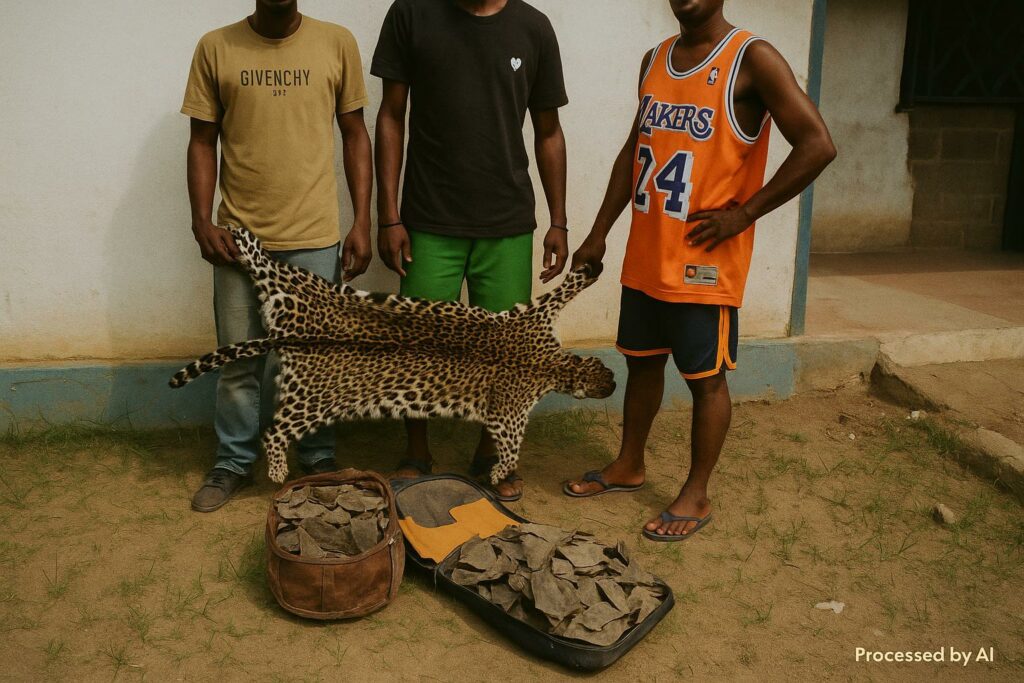A calibrated verdict with regional resonance
On 26 June the Tribunal of First Instance in Impfondo, capital of Likouala, imposed three-year imprisonment on one defendant and two-year terms on his accomplices for offences related to the trafficking of a panther skin, claws and a sizeable cache of giant pangolin scales. The court simultaneously levied fines and civil damages amounting to four million CFA francs, a figure that, while significant in local economic terms, remains proportionate to precedents recorded in similar cases in Owando and Dolisie according to data compiled by the Wildlife Conservation Society. Observers from the Projet d’Appui à l’Application de la Loi sur la Faune (PALF) welcomed the decision as “a signal that jurisprudence in northern Congo is catching up with the sophistication of trafficking networks” (PALF field communiqué).
From discreet arrests to an open courtroom
The arrests unfolded on 27 May after gendarmerie officers, acting on intelligence shared by forestry agents, intercepted Jodel Mouandola and Arel Ebouzi on the river wharf at Impfondo. Hours later Parfait Mbekele, identified as the alleged supplier, was brought back from Epéna-Centre. During four public hearings the defendants admitted the essential facts, an attitude the presiding judge described as “cooperative but not exculpatory”. Court records underline that the seizure included an entire panther hide in tradeable condition, four claws cleanly detached, and several kilogrammes of pangolin scales, commodities often funnelled through Oubangui river corridors toward markets in Cameroon and Nigeria, as documented in a 2023 TRAFFIC report on Central African trade routes.
Domestic statute meets international commitment
The judgment rests on Law 37-2008 concerning wildlife and protected areas, whose Article 27 prohibits the possession or circulation of trophies of fully protected species without a scientific exemption. Equally relevant is Congo-Brazzaville’s 1983 accession to the Convention on International Trade in Endangered Species of Wild Fauna and Flora. A senior official at the Ministry of Forest Economy, contacted by telephone, stressed that “the Impfondo ruling helps consolidate our compliance record ahead of the next CITES standing committee”. Analysts at the Central African Forests Observatory add that consistency in local courts is indispensable to preserve Congo’s credibility in climate finance negotiations, a field where biodiversity protection increasingly features as a co-benefit metric.
Socio-economic undercurrents in Likouala
Likouala’s dense forests and limited formal employment render wildlife exploitation an alluring livelihood, a nuance acknowledged by the bench. Nonetheless the court argued that deterrence is essential, citing a rise in pangolin interceptions along the Impfondo-Bangui axis during the first quarter of 2025. Community leaders interviewed by Les Dépêches de Brazzaville emphasised the need for alternative income programmes. In response, the provincial delegation of the Ministry of Vocational Training plans to extend sustainable fisheries workshops to Epéna and Dongou later this year, following a model co-designed with the African Development Bank. Such initiatives dovetail with President Denis Sassou Nguesso’s national strategy for the green economy, positioning conservation enforcement not as an isolated punitive measure but as one component of a broader rural development agenda.
Toward strengthened cross-border coordination
Wildlife crime in the Congo Basin rarely recognizes national boundaries. Officials from the Congolese and Democratic Republic of Congo customs services met in Brazzaville in early June to revitalise a memorandum of understanding on real-time data exchange, an effort supported by INTERPOL’s Project LEAP. The Impfondo convictions, coming barely three weeks after that meeting, illustrate how judicial follow-through can reinforce diplomatic overtures. Regional envoys interviewed by Radio Congo believe the case may foster future joint operations along the Oubangui. For the diplomatic community, the lesson is twofold: local courts possess the capacity to apply sophisticated environmental legislation, and concerted regional diplomacy can magnify that capacity, advancing both biodiversity conservation and the rule of law across Central Africa.

